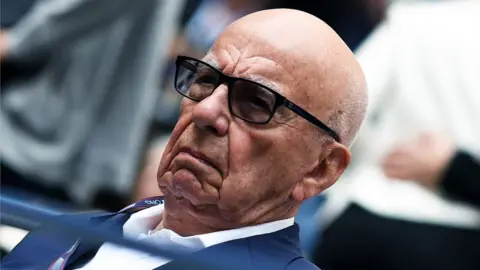The coming bidding war for Sky
Why does everyone want to buy Sky PLC?
The British broadcaster now has three huge international suitors: 21st Century Fox, Disney (through their bid for Fox), and Comcast, whose bid was formalised today.
For 21st Century Fox and Rupert Murdoch in particular, the bid is emotional as well as commercial. He set up the precursor to Sky in 1989 and it nearly bankrupted him. It is a business he has seen bloom and grow.
In 2010-11, his family bid for full control, but called it off because of the phone-hacking scandal. It was always unfinished business. The family's latest bid for full control has been stuck in the regulatory quagmire for well over a year, to their frustration.
 AFP GETTY
AFP GETTY What unites these three companies is above all, of course, immutable commercial logic. The case for acquisition is partly about Sky's model, and partly about the structural changes in the industry.
The entrance of massive technology companies to the media content business - above all Netflix - has meant a huge influx of cash and an explosion in consumer choice. Together with smartphone technology, this has shifted behaviour from linear TV, which is restricted by schedules, to streaming, which allows viewers to watch what they want when they want.
Apple are moving into content in a big way. Some people think the company would be smarter just to buy a content giant - like Comcast, Disney, or Fox, for example - but Apple doesn't seem to be the acquiring kind when it comes to television-style Media. And in any case, that might face regulatory obstacles, so they want to do it their own way.
Amazon has launched itself upon content in an expensive fashion. That's where you mostly find Jeremy Clarkson driving new cars these days. Facebook is doing ever more in content creation, and its Facebook Watch initiative and long-rumoured interest in live Sport suggest aggressive intent.
All of this means the competition for eyeballs is ferocious and unprecedented. Some eyeballs are still at the end of pipes, or distribution channels if you like; and around 23 million pairs of European eyeballs belong to Sky customers.
The disruption-driven consolidation in Media today is, as I have often written on this page, about the creators of content coming together with the owners of those pipes.
A juicy prospect
The other side to this is that Sky is a very attractive business right now.
Those 23 million customers are a juicy prospect. The main thing is that the fundamentals of the company seem well placed to exploit the opportunities of the next few years. Crucially, those customers pay subscriptions for Sky content. Sky has data on them, and can tailor its services accordingly; moreover, it means that although it makes money from advertising, it is not dependent on advertising alone.
 Comcast
ComcastIf you are a Media business dependent on advertising alone right now, you watch with horror as Facebook and Google gobble up ever more advertising dollars. This is one reason Adam Crozier, the former Chief Executive of ITV, tried to diversify that business by buying production capabilities. He wanted to reduce the vulnerability inherent in being solely dependent on advertising.
Sky offers a broad service of high-quality content, has innovated well to improve its mobile platform, and has a lot of loyal customers in Europe - a market the likes of Comcast and Disney really want to crack. Above all, it knows its customers, because it takes money from them.
This is why, while many traditional Media flail among the vicissitudes of the ad market, the company that nearly bankrupted Murdoch is today inviting him to enter a bidding war for it.
If you're interested in issues such as these, please follow me on Twitter or Facebook; and also please subscribe to The Media Show podcast from Radio 4. I'm grateful for all constructive feedback. Thanks.
